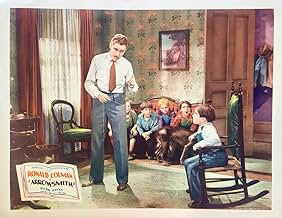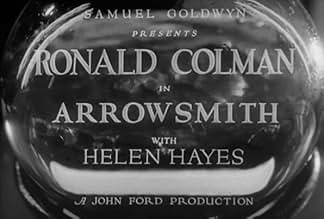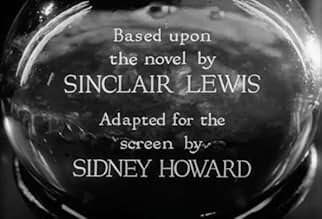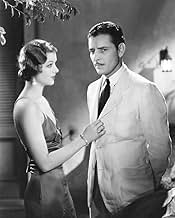IMDb RATING
6.2/10
2.2K
YOUR RATING
A medical researcher is sent to a plague outbreak, where he has to decide priorities for the use of a vaccine.A medical researcher is sent to a plague outbreak, where he has to decide priorities for the use of a vaccine.A medical researcher is sent to a plague outbreak, where he has to decide priorities for the use of a vaccine.
- Nominated for 4 Oscars
- 4 wins & 4 nominations total
Alec B. Francis
- Twyford
- (as Alec Francis)
Erville Alderson
- Pioneer
- (uncredited)
Beulah Bondi
- Mrs. Tozer
- (uncredited)
Florence Britton
- Miss Twyford
- (uncredited)
Josephine Brown
- West Indies Village Bride
- (uncredited)
Nora Cecil
- Nurse
- (uncredited)
- Director
- Writers
- All cast & crew
- Production, box office & more at IMDbPro
Featured reviews
Arrowsmith (1931)
*** (out of 4)
John Ford's adaptation of Sinclair Lewis' novel about a young doctor (Ronald Coleman) who constantly fears that he's not as good as everyone says. The doctor keeps struggling with his duties to his profession as well as his duties to his wife (Helen Hayes). I wasn't expecting too much out of this film but was pleasantly surprised how much I enjoyed it even with all of its flaws. Ford's direction is fairly weak as he never really brings any flair to the material but this is made up with some terrific performances. Coleman steals the film and really delivers all the goods as he's able to show the frustrations of a doctor trying to do the right thing for everyone. Hayes is also very good in her supporting role as is the supporting cast, which includes Richard Bennett, A.E. Anson and Myrna Loy.
*** (out of 4)
John Ford's adaptation of Sinclair Lewis' novel about a young doctor (Ronald Coleman) who constantly fears that he's not as good as everyone says. The doctor keeps struggling with his duties to his profession as well as his duties to his wife (Helen Hayes). I wasn't expecting too much out of this film but was pleasantly surprised how much I enjoyed it even with all of its flaws. Ford's direction is fairly weak as he never really brings any flair to the material but this is made up with some terrific performances. Coleman steals the film and really delivers all the goods as he's able to show the frustrations of a doctor trying to do the right thing for everyone. Hayes is also very good in her supporting role as is the supporting cast, which includes Richard Bennett, A.E. Anson and Myrna Loy.
Ronald Colman,(Dr. Martin Arrowsmith),"A Tale of Two Cities" '35, is a young doctor who starts out in life and desires to progress into the laboratory and look under a microscope all day long. However, he no long completes medical school and meets up with Helen Hayes,(Leora Arrowsmith) and on the first date, asks her to marry him. Martin and Leora are madly in love with each other but it is difficult for Martin to establish himself as a doctor, so they move to South Dakota. Myrna Loy,(Joyce Lanyon),"The Mask of Fu Manchu",'32 plays a sexy gal who has eyes for Martin and could lead to some problems. In 1931 this was a big hit film because of Helen Hayes, a great theatrical actress and Ronald Colman the thrill of most ladies during this period of time. Myrna Loy was young and pretty and getting great attention from Hollywood and the general audiences. There was plenty of smoking through out this film and it clearly shows how the world has finally changed about its view on smoking.
Sinclair Lewis wrote ARROWSMITH in 1923, after the first two of his blockbuster novels that dissected American Society (MAIN STREET and BABBITT). Lewis decided to make a complete study about the medical profession. As such it was brilliant - far more brilliant than this movie is. If one can think of the novel as what it is - an expose about what is wrong concerning the medical profession - the novel is a glass of fine champagne, and this movie version is a glass of lemonade! Lewis takes us along the entire career of Martin Arrowsmith - through medical school, through practice in a small town, through his marriage to Leora Tozer, through his going to the big city (New York) where he is connected to a large, well-known Foundation, to his battling the plague (and losing his wife and his co-worker), and his finally coming to terms with what he wants from his profession. For the key to the novel is that medicine is extremely lucrative, but Martin is very idealistic. He does not seek riches, but wants to help his fellow man.
The problem, as the film proceeds, is that the people who run or control the profession (or society, for that matter) can care less for the idealistic goal. For one reason or another they want results that are pragmatic or banal. For example, one would think that the Foundation (a swipe at the Rockefeller Foundation, by the way) would be really gung ho about an idealistic medical researcher. They certainly have the laboratories and talent for real progress. But they also have a strong desire for immediate results that can be used for propaganda purposes. So they keep pushing aside certain desires for private testing that Arrowsmith and his mentor Max Gottlieb (A.E. Anson) are requesting on the bubonic plague serum. The director of the foundation insists that Arrowsmith goes to a plague saturated island with his co-discoverer, for immediate SUCCESSFUL results. This leads to massive tragedy in the novel and the film.
This doesn't come across too clearly in the film. Instead it looks like Martin (Colman) would like more time to test, but the emergency prevents it. This weakens the novel's criticism. And this is not the only example.
When Martin starts out in the small town, the local medical community has this idiot running it who knows squat about modern medicine, but is great at self-advertising. The man, who looks like Theodore Roosevelt, thinks that the height of local medical activity is running a "health day" parade. This too is not in the movie.
The film, in short, short-changes Lewis's wonderful novel. In fact, more of the spirit of Lewis's attack can be found in the Robert Donat - Rosalind Russell - Ralph Richardson film THE CITADEL (based on an A. J. Cronin expose novel). That's rough, considering how important the critique by Lewis really was.
The film's cast gives it their all, particularly Helen Hayes (still the young actress who won her first Oscar that same year for THE SIN OF MADELON CLAUDETTE), Myrna Loy (in a heavily cut role) and Colman. John Ford's directing was somewhat mediocre in this film, unlike later works of his. So I give it a "6" out of "10".
The problem, as the film proceeds, is that the people who run or control the profession (or society, for that matter) can care less for the idealistic goal. For one reason or another they want results that are pragmatic or banal. For example, one would think that the Foundation (a swipe at the Rockefeller Foundation, by the way) would be really gung ho about an idealistic medical researcher. They certainly have the laboratories and talent for real progress. But they also have a strong desire for immediate results that can be used for propaganda purposes. So they keep pushing aside certain desires for private testing that Arrowsmith and his mentor Max Gottlieb (A.E. Anson) are requesting on the bubonic plague serum. The director of the foundation insists that Arrowsmith goes to a plague saturated island with his co-discoverer, for immediate SUCCESSFUL results. This leads to massive tragedy in the novel and the film.
This doesn't come across too clearly in the film. Instead it looks like Martin (Colman) would like more time to test, but the emergency prevents it. This weakens the novel's criticism. And this is not the only example.
When Martin starts out in the small town, the local medical community has this idiot running it who knows squat about modern medicine, but is great at self-advertising. The man, who looks like Theodore Roosevelt, thinks that the height of local medical activity is running a "health day" parade. This too is not in the movie.
The film, in short, short-changes Lewis's wonderful novel. In fact, more of the spirit of Lewis's attack can be found in the Robert Donat - Rosalind Russell - Ralph Richardson film THE CITADEL (based on an A. J. Cronin expose novel). That's rough, considering how important the critique by Lewis really was.
The film's cast gives it their all, particularly Helen Hayes (still the young actress who won her first Oscar that same year for THE SIN OF MADELON CLAUDETTE), Myrna Loy (in a heavily cut role) and Colman. John Ford's directing was somewhat mediocre in this film, unlike later works of his. So I give it a "6" out of "10".
The fact that an idealistic medical doctor was the protagonist in Arrowsmith is the reason why John Ford must have been attracted to this story and agreed to film it for Sam Goldwyn.
Allegedly it was not a happy collaboration. Two very individualistic men wanted to have their imprimatur on the film. They never worked together on a finished product again, though Ford did start filming The Adventures of Marco Polo for Goldwyn and quit.
I read the novel way back in the day when I was in high school and we only get the second half of it. There's a great deal in the book before Ronald Colman as Martin Arrowsmith goes to work for the Research Foundation and A.E. Anson as Max Gottlieb. You miss quite a lot of the character development of Arrowsmith.
Of course the plot mostly centers on Colman and his other mentor, Richard Bennett going to a Caribbean Island where there has been an outbreak of plague. Along for the trip is Helen Hayes who is Colman's wife Leora.
Colman is there to test a new serum and he's under orders as a researcher to only administer the real stuff to half his patient and a placebo to the others as a control group. This is where the racism of the time kicks in as these human guinea pigs are black, probably the descendants of runaway slaves. There is a black doctor named Marchand in the cast played by Oliver Brooks and it is a rarity among black performers at the time in that the role was hardly servile at all. Brooks seems to go along with the controlled experiment, but he becomes one of many in the cast to meet a tragic end.
With some of what came out about the Tuskegee experiments later on Arrowsmith may have been quite on target without knowing it. A harrowing thought.
Colman and Hayes are an attractive pair of leads. Myrna Loy has a much abbreviated role in the film as a New York socialite that Colman meets down in the islands. In the book he has an affair with her and marries her later on. You won't see that here.
Arrowsmith is a good film though I wish more of Lewis's story got into the final product. But it probably would have run for three hours and films just didn't do that back then.
Allegedly it was not a happy collaboration. Two very individualistic men wanted to have their imprimatur on the film. They never worked together on a finished product again, though Ford did start filming The Adventures of Marco Polo for Goldwyn and quit.
I read the novel way back in the day when I was in high school and we only get the second half of it. There's a great deal in the book before Ronald Colman as Martin Arrowsmith goes to work for the Research Foundation and A.E. Anson as Max Gottlieb. You miss quite a lot of the character development of Arrowsmith.
Of course the plot mostly centers on Colman and his other mentor, Richard Bennett going to a Caribbean Island where there has been an outbreak of plague. Along for the trip is Helen Hayes who is Colman's wife Leora.
Colman is there to test a new serum and he's under orders as a researcher to only administer the real stuff to half his patient and a placebo to the others as a control group. This is where the racism of the time kicks in as these human guinea pigs are black, probably the descendants of runaway slaves. There is a black doctor named Marchand in the cast played by Oliver Brooks and it is a rarity among black performers at the time in that the role was hardly servile at all. Brooks seems to go along with the controlled experiment, but he becomes one of many in the cast to meet a tragic end.
With some of what came out about the Tuskegee experiments later on Arrowsmith may have been quite on target without knowing it. A harrowing thought.
Colman and Hayes are an attractive pair of leads. Myrna Loy has a much abbreviated role in the film as a New York socialite that Colman meets down in the islands. In the book he has an affair with her and marries her later on. You won't see that here.
Arrowsmith is a good film though I wish more of Lewis's story got into the final product. But it probably would have run for three hours and films just didn't do that back then.
Based off the Lewis Sinclair epic, Arrowsmith follows a young doctor's journey as he explores different avenues of medicine and research. As you might expect, from page-to-screen, a little ends up on the cutting room floor. Still, if you like medical movies, you'll probably want to give this classic a try. It reminded me of a cross between The Citadel and The Doctor and the Girl.
As I've frequently said, there are two sides to Ronald Colman, and Arrowsmith contains the version with a stick perpetually lodged somewhere uncomfortable. He's not as passionate as he is in other movies, so keep that in mind. For a better first impression of him, try A Tale of Two Cities. You'll get a fine first impression of Helen Hayes, though, who plays his long-suffering wife. She's young and pretty in this one, a far cry from her Miss Marple little-old-lady persona of later decades. She has more passion than her husband, and she repeatedly pushes him to pursue his medical interest, even at the expense of their personal life. She never wants to be left behind, and she follows him all around the world as he conducts research for the bubonic plague.
You'll see Myrna Loy for about five minutes, but it's not her movie, so don't expect anything other than a pretty face. Colman and Hayes have pretty faces, too, and it is always fun to see a very old movie, but it's not my favorite. I like The Doctor and the Girl better, so if you find this movie lacking, you might want to check out Glenn Ford's take on it.
As I've frequently said, there are two sides to Ronald Colman, and Arrowsmith contains the version with a stick perpetually lodged somewhere uncomfortable. He's not as passionate as he is in other movies, so keep that in mind. For a better first impression of him, try A Tale of Two Cities. You'll get a fine first impression of Helen Hayes, though, who plays his long-suffering wife. She's young and pretty in this one, a far cry from her Miss Marple little-old-lady persona of later decades. She has more passion than her husband, and she repeatedly pushes him to pursue his medical interest, even at the expense of their personal life. She never wants to be left behind, and she follows him all around the world as he conducts research for the bubonic plague.
You'll see Myrna Loy for about five minutes, but it's not her movie, so don't expect anything other than a pretty face. Colman and Hayes have pretty faces, too, and it is always fun to see a very old movie, but it's not my favorite. I like The Doctor and the Girl better, so if you find this movie lacking, you might want to check out Glenn Ford's take on it.
Did you know
- TriviaCensorship at the time meant that the subplot of Arrowsmith's liaison with another woman while still married meant that most of Myrna Loy's scenes were drastically cut. Although every attempt was made to restore the present version to its original length, there are still about 10 minutes missing.
- GoofsArrowsmith conducts a trial of his serum by giving it to half the potential plague victims and giving the other half nothing. Anyone who tried this in real life would provoke protests, if not riots. So these trials are conducted by giving half the people a placebo and not telling anyone which they are getting.
- Quotes
Dr. Martin Arrowsmith: God give me clear eyes and freedom from haste. God give me anger against all pretense. God keep me looking for my own mistakes. God keep me at it till my results are proven. God give me strength not to trust to God.
- Crazy creditsOpening credits prologue: The story of a man who dedicated his life to service and his heart to the love of one woman.
- Alternate versionsMyrna Loy's role was substantially reduced when the film was reissued because the Production Code had taken effect. The missing scenes have been restored on the DVD.
- ConnectionsReferenced in Citizen Kane (1941)
- SoundtracksWilliam Tell Overture
(1829) (uncredited)
Written by Gioachino Rossini
Played on piano from a recording
- How long is Arrowsmith?Powered by Alexa
Details
- Release date
- Country of origin
- Languages
- Also known as
- El doctor Arrowsmith
- Filming locations
- Production companies
- See more company credits at IMDbPro
- Runtime
- 1h 48m(108 min)
- Color
- Aspect ratio
- 1.20 : 1
Contribute to this page
Suggest an edit or add missing content





































